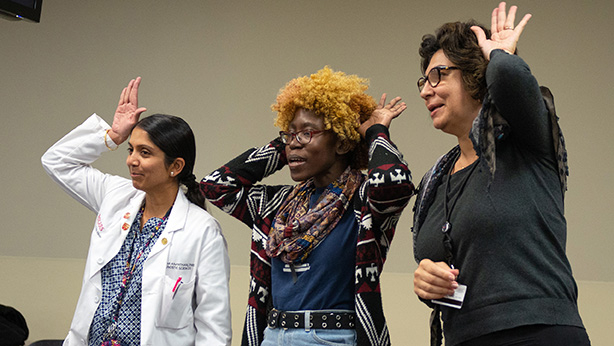Rutgers Medical Researchers Use Improv to Improve Communication Skills
Workshop helps scientists communicate complex ideas to patients, policymakers

Person A is a time traveler from 300 years ago. Person B is expecting a phone call – and must explain how cellphones work before the time traveler accuses them of being a witch.
A group of Rutgers New Jersey Medical School pathologists, immunologists, cancer research specialists and surgeons are learning to play this and other improv games, which are intended to help them better communicate the complexities of science and medicine to each other and the general public.
The “Improv to Improve” workshops were created through a partnership between Nicholas Ponzio at Rutgers New Jersey Medical School and David Dannenfelser at Rutgers University–New Brunswick’s Mason Gross School of the Arts, recognizing that medical researchers and clinicians have to be able to speak effectively and plainly with non-scientists, including patients, policymakers, taxpayers and prospective donors. The “Improv to Improve” workshop series was created as a faculty development activity sponsored by Rutgers Office of Academic Affairs and is intended for Rutgers personnel with busy schedules.
The Rutgers program is part of a trend nationwide in which a growing number of researchers from many fields of study are looking to better communicate their work to the outside world.
“Scientists and health care practitioners have to move beyond complicated jargon to find a common understanding and consider the other person’s point of view when discussing highly technical information,” said Dannenfelser, a Mason Gross theater professor and instructor of the improv workshop.
The workshops were conceived by Ponzio, a professor of pathology, immunology and laboratory medicine at New Jersey Medical School and the Rutgers School of Graduate Studies, after Ponzio took a six-month sabbatical in 2015 to study improv at the Alan Alda Center for Communicating Science at Stony Brook University in New York.
Ponzio and colleagues from other Rutgers schools and industry developed a graduate level course for Ph.D. students. “The methods we use in the ‘Communicating Science’ course fill a void in the doctoral program at Rutgers School of Graduate Studies by challenging trainees to think about how they tell people about their research,” Ponzio said. “We’re providing trainees with additional ways to communicate their cutting-edge scientific research more clearly, vividly and understandably to diverse audiences.”
“Dr. Ponzio’s workshops really helped me understand that we spend too much time researching and not enough time on communicating even though communication is essential to helping others benefit from our findings and to secure funding for an expanded study,” said Qunfeng (Frank) Wu, a cancer research associate at New Jersey Medical School.
Ponzio hopes to expand the workshops to other disciplines and audiences across Rutgers University.
“Biomedical research scientists aren’t the only ones who have trouble communicating. Rutgers students and trainees in additional science and health related areas, as well as business, law and other professions, can use help discussing their work. This really could be part of something that benefits people from all schools and departments,” he said.
The “Improv to Improve” workshops run Fridays through Nov. 9.
Media seeking to attend or learn more about the workshop should contact Nicholas M. Ponzio.